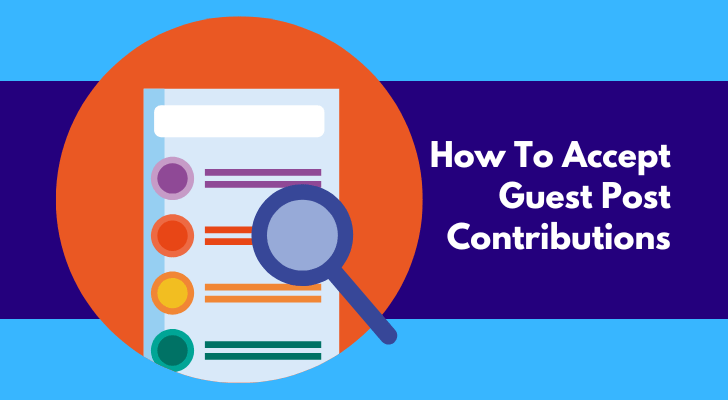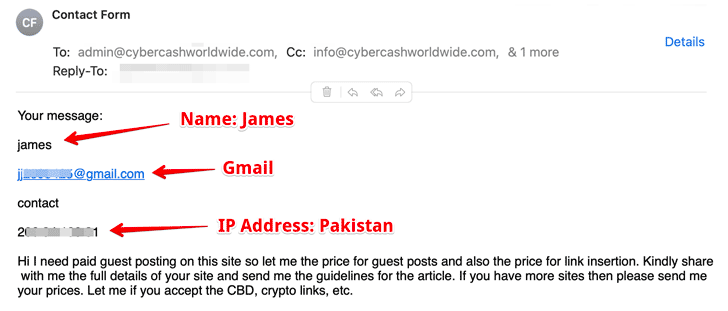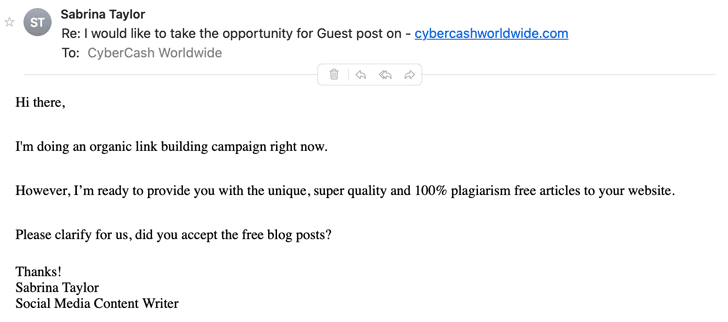If someone approaches you and requests to publish a guest post, what will you do? Well, it depends. Depends on whether the person who contacted you is real or fake.
But whoever they are, you know there's only one thing in their mind - linking back to their site. They don't care much about you or your website, and now that AI can do a decent job, whatever content they contribute is very unlikely to add value to your site. So don't compromise.
Here's how you can accept (or reject) a guest post or sponsored post contribution request.

Are They Real or Fake?
So someone emails you, saying they want to contribute a guest article to your website. Here are the steps you should take to check who they are, whether they are real or fake.
Step 1: Does the email contain a website URL? Do they say they are the owner of https://xxx.com?
- If yes - go to Step 2.
- If not - they're fake.
Step 2: Check the sender's email address.
- If the email's sent from a domain-specific email address (e.g. daniel@xxx.com) then it's a real person, so communicate as you normally do. Will come back to that later.
- If it's a Gmail (or any free email such as Yahoo mail, Hotmail, etc.) then they're unlikely to be the real owner of the site. They're fake.
When I say fake, they are likely to be someone who tries to make money by selling backlinks to other website owners anonymously. They often (or almost always);
- Say that they are a blogger/writer.
- Say that they are an SEO agent with "a lot of clients."
- Say that they want to have a long-term business with you.
- Call themselves a generic English name (e.g. Adam Taylor, Sophie Nicholls, etc.)
- May display their face photo on the email, which is fake.
They may be a real blogger who genuinely wants to contribute a guest post to your site, who knows? But the fact is, they already failed to prove who they really are. Then you shouldn't waste your time communicating with a stranger online.
How Much Should I Charge For a Guest Post?
Most of the article contributors are either SEO (backlinking) agents or professional writers. It means that they make money by charging their clients for providing a backlink - hopefully from your site. They’re running a business, so there's no way you should voluntarily give them your web space for free. Charge them.
But if a contributor is "fake" - they haven't proven their identity - what should you do? Would you flatly reject their request? Ignore their email completely? Or would you be happy as long as they pay your asking price? It's entirely, entirely up to you. Read on, I'll give you some points to consider.
#1 Charge Them Per Link, Not Per Post
First of all, don't charge them per post. Charge them per link in their article. Some contributors place one outgoing link to their client's site in their guest article, while others make more money by placing multiple links in one article, each one to a different client's webpage. They are killing 4-5 birds with one stone, then it will only make sense if you charge them per number of links, in my opinion.
#2 How Much Should You Charge?
It's entirely up to you. Perhaps you can take your other income into consideration and compare, such as your average revenue from one affiliate link or your monthly Adsense revenue. Here are some ways to charge the contributors;
- $80 for publishing your guest post. But only one outgoing link is allowed.
- $50 per link or $90 for 2 links in a post.
- $60 per dofollow link or $45 per nofollow link.
Tell them that you may add some extra links to their guest post - internal links plus a couple of outgoing links to authority sites. Don't let them add extra links to authority sites for free.
#3 Charge for a No-Follow Link?
Yes, make sure to charge them for nofollow links too. Again, they’re making money by placing a link on your site to their client’s site. Their clients are simply paying for an SEO service, and probably don’t know what dofollow and nofollow mean.
#4 Link Insertion Price - Charge More
Bizarrely, a lot of SEO/backlinking agents ask you to offer a lower price for link insertions - placing a link in one of your existing posts.
For example, if you charge $80 for publishing a guest post, they may ask you if you can simply insert a link in one of your pages for $40.
They're not providing a guest post, i.e. they're putting in zero effort. They're asking you to sneak their link into your existing content for a lower price? This rationale wouldn't make sense!
For a link insertion to your existing post - you should be charging a lot more. $60 per month, for example. Ask them how many months they want the link to their client's site inserted. If they want it for 3 months, then charge them 3 x $60 = $180, paid in advance. Make sure to delete the link exactly after 3 months in this case!

What do you mean you "need paid guest posting"?
He calls himself James but the IP address shows that he's from Pakistan. Mentions CBD - nothing to do with our site. He's obviously sending out the same message to multiple sites randomly.
Don't Negotiate Your Price With a Stranger
Some may challenge your price and say it's too high, they can't afford it, or their "company" has a low budget. But why should you negotiate your price with someone who has just approached you for the first time? It's not a flea market. It's a website that you own, that you've been putting so much time and effort for whatever the length. So if anyone tries to negotiate, consider the following points;
Your Domain Authority? Not Your Problem!
Some contributors - particularly backlinking agents - may say that they decide how much they should pay according to your domain authority score. For example, your website’s DA score is 20, so they shouldn’t be paying more than $40.
Tell them that's their problem, not yours. You set your own standards and they have no right to tell you to follow their logic. Tell them that you’re not lowering your standards for them.
“Copyscape Protected”
Many agents/freelance writers ask for a discount because their article will be “100% unique, high-quality, and Copyscape protected”.
Well, tell them that those are the absolute-minimum requirement, and you will still charge a normal price.
Needless to say, you should be scanning a guest article with a plagiarism checker each time you receive it. If a plagiarized sentence is found or the article turns out to be low quality, you have the right to either reject it or accept it for money.

No, you're not a content writer, you're just a Gmail user with a fake name.
A “Long-Term Business Relationship”
Many agents ask you for a discount because they’re looking to engage in a long-term partnership with you. They claim to have a lot of clients, so they’ll send you at least one (or more) article every month.
Don’t believe a word of it - the majority of them never come back after one.
You can tell them that you’ll consider giving them a discount on their 3rd article and thereafter.
If a Real Blogger Wants To Collaborate
If a person who requests to contribute a guest post to your site turns out to be a real, genuine blogger, who wants to backlink their site, what do you do?
That person’s email address is domain-specific, their photo is displayed on their site, they have a LinkedIn profile…
Depending on how nice they are, I would respect their effort and publish their guest post for free. You want to be kind to those who are trying so hard to establish their online business.
But you also want to think about what kind of benefits you can get - if any - from their guest contribution, right? Let’s face it, the article they give you is unlikely to be the best of the best. If it’s the best of the best, they’ll probably publish it on their own site. But is it unique? As in, a breath of fresh air? Showing their personality?
Tell them that you don’t want an all-theoretical, boring general guide.

Also read: Can You Make Money By Ghostwriting?
Say No To General Guides
The internet is full of general guides - listicle articles, such as;
- 10 Ways To Achieve Your Goals And Become More Productive
- 15 Things You Should Know Before Buying a House
- 12 Strategies To Create a Powerful Social Media Strategy
- The 10 Reasons Why You Should Have An Insurance Broker
General guides are boring. All of them. Our site is full of general guides, as if they can actually help anyone - I very much doubt it, to be honest.
As I mentioned earlier, you can get that kind of content written by AI pretty quickly, thanks to ChatGPT.
Yet still, many self-proclaimed writers tell you that they can contribute a high-quality article that helps your site boost traffic.
You know that’s total BS. Whether they use an AI writer or Google search themselves, general guides never “boost traffic” for you. 3 years ago, maybe. But not anymore.
So when someone approaches you to say they want to “share their knowledge”, what should you say?
You can tell them that the article must be;
- Based on their own experience,
- Including their own opinions, positive and negative,
- Accompanied by at least 3 screenshots (copyright-free) to prove that it’s their own experience.
Because you don’t need anyone to “share their knowledge” with you or your readers. You possibly want them to share their experience, right?
Mind you, AI can write as if it’s voiced by a real person, too. So when you receive the article, read it, and if any part sounds AI-ish, then ask them to re-write it.
How To Accept Guest Post Contributions - Final Words
I hope this “how to guide” (!) has helped you decide what to do when you receive guest/sponsored post requests.
The money you receive for publishing a guest post is just a small extra (don’t let it become your main income source!) They often call it a collaboration but no, it’s not a collaboration as far as you’re concerned. It’s your website and you have total control over it, so don’t compromise. Reject as many times as you wish until you’re happy to publish the content.
What Do You Advocate?

Thank you for the useful article, Ray. I received a guest post request once but I didn’t accept it because when I asked for his blog site URL, he said he was a reseller. It meant that I would never know he could be reselling links to illegal sites. Also I cannot remember how much he was offering but I didn’t like the idea of having a link to an unknown site permanently in exchange of a one off payment. I read your article now and understand how it works, so thank you.
I also agree with you on the price that they decide according to the DA score. Unless you are trying to make as much money solely for offering guest post opportunities, you shouldn’t let other people decide your price! Thank you for the insightful article!
Thanks Clair for your comment. I’m glad you agree re: negotiating the price. When received such a request from someone who’s not a blogger (reseller or backlinking agent) webmasters should never negotiate the price unless they’re desperate, for that very reason. Thanks for sharing your experience, I wish you all the best!
Great advice, thanks. I get too many fake users too, they all say they are seo agents or professional writers but when I ask them for proof they didn’t respond to my request but instead they persistently ask link building collaborations. I block them.
Thanks Roger, for sharing your experience. Yes, blocking them seems to be the most sensible idea!